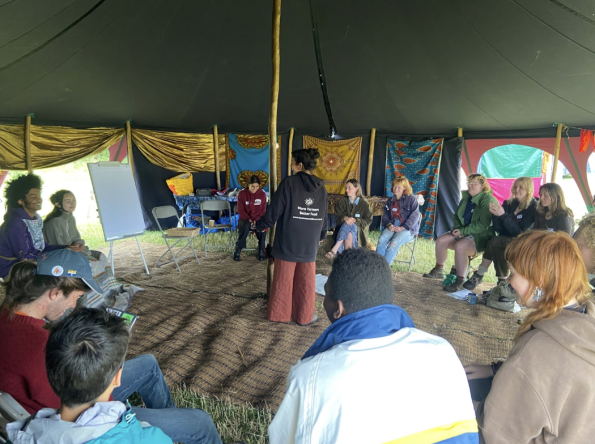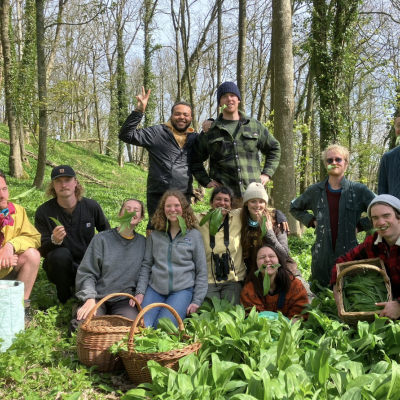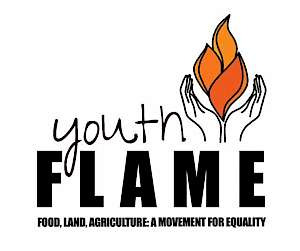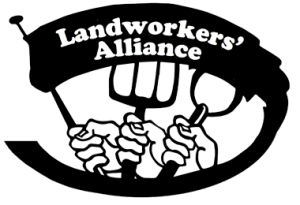Tell us about FLAME!
FLAME (Food, Land, Agriculture – a movement for equality) is the youth identity group of Eating Better partner network the Landworkers’ Alliance. The LWA is a union of land-based workers across the UK, operating as member-led regional and identity groups, created in recognition of those who are underrepresented in land work to ensure that there is a space for us, and that our voices are heard in a sector that is dominated by older white men.
Our 3 principle aims are:
- To demand food justice and enable access to good quality, affordable food for all
- To enable greater youth involvement in sustainable food production and landwork
- To promote agroecology as a viable solution to the climate and biodiversity crisis
How were you introduced to this work and what compelled you to join?
I was introduced to FLAME at a youth food and farming event, and I was inspired to join because of its commitment to being overtly political and to recognising the wider systems issue that is responsible for the problems in our food and farming system. I wanted not only to connect with others who shared my interest in the land, but who also shared my social justice values - something I had not found in the agricultural world previously. I had just finished the first year of my Agroecology MSc at an agricultural university, and found myself feeling somewhat isolated due to my non-farming, urban, non-white background, as well as holding profoundly different views on politics and how to solve the problems in our farming system from those of my peers. I sought out a community of other young people who would make me feel understood, and that I had a proper community behind and next to me in order to initiate real change.
How do you organise as a group?
FLAME is entirely member-led and non-hierarchical, but we choose to have a group of coordinators, of which I am one, who are closely in touch with the LWA and who organise our meetings, trips, comms, finances and run workshops. As a fairly young movement, we are still learning how to work together and figuring out our systems and approaches, learning from our wins and failures. Navigating our different capacities requires a continual process of checking in and extending understanding and empathy towards each other. At the foundation of everything that we do is care: for the land and for people. We practise that in everything we do. We meet twice a month online for organisational meetings and more laid-back fun hangs, as well as trying to do as much in person as we can, whether that be land-based training, farm visits, visioning weekends, and more.

Why is now an important time to amplify youth voices in the food movement?
It’s always been critically important for youth voices to be centred in the food movement, but it seems that this reality is finally being realised. We are facing an alarming intersection of climate and political catastrophe and a history of colonialism and imperialism that has not been dealt with -- and people are suffering. We are suffering. Young peoplefeel the effects of living under these systems violently, and must be at the forefront of the solutions. We are the ones inheriting this world and its messes, and we must help lead in creating solutions. We have vision, energy, and collective power. However, this is not to say the work to be done is not intergenerational, and we recognise the huge contributions of our elders, especially those of the global majority who have so often been silenced and their work unrecognised. We learn from them, and we work to continue their legacy.
What movements do you draw inspiration from across the UK or internationally?
As part of the LWA we are also part of a greater international peasant solidarity movement, La Via Campesina. We draw inspiration from the peasant movements of the global south and their actions towards food sovereignty and self-mobilisation. We are inspired by the work of those in PRALER (The Planet Repairs Action Learning Educational Revolution), a joint initiative of communities of resistance and their work towards and centring planet repairs. We recognise that food and land justice in the UK does not exist in isolation to the rest of the world, that true justice means acting and thinking globally and in solidarity with the global south.
How can people join or support the work that you do?
If you are 16-28, you are welcome to join us at FLAME by becoming a member or supporter, for £5 a year. This gives you access to all of our trips and events. Most are free of charge or with bursaries available, as we always want our events to be accessible to all. You will receive our monthly newsletter and be added to our whatsapp chat, hopefully finding within it a beautiful community of young ‘hopers’ and big carers. Becoming a part of the LWA also means that you can join your local regional group and get connected to all the goings on in your area and find friendship, community, and support. You can follow us on Instagram @youth__flame.


